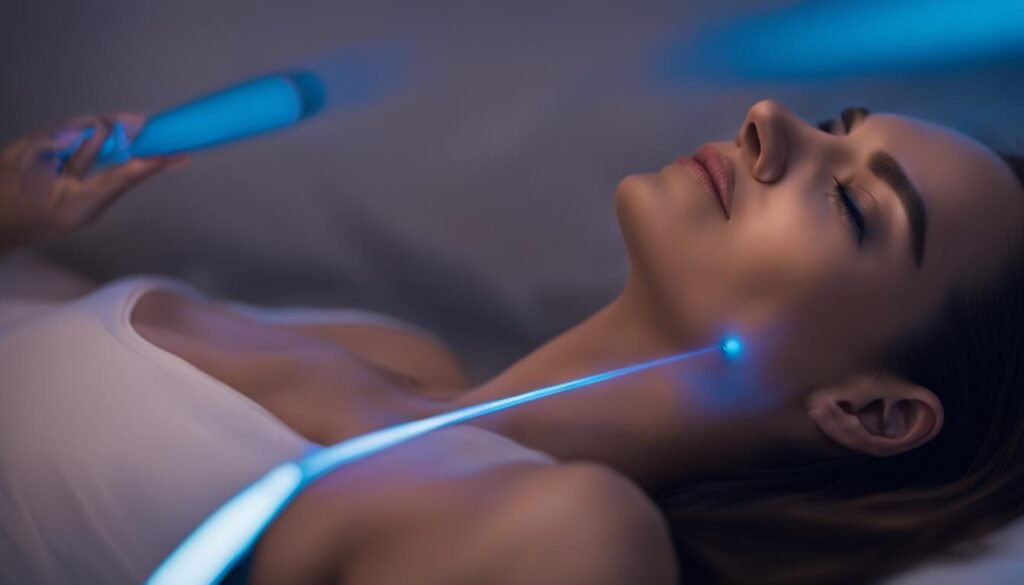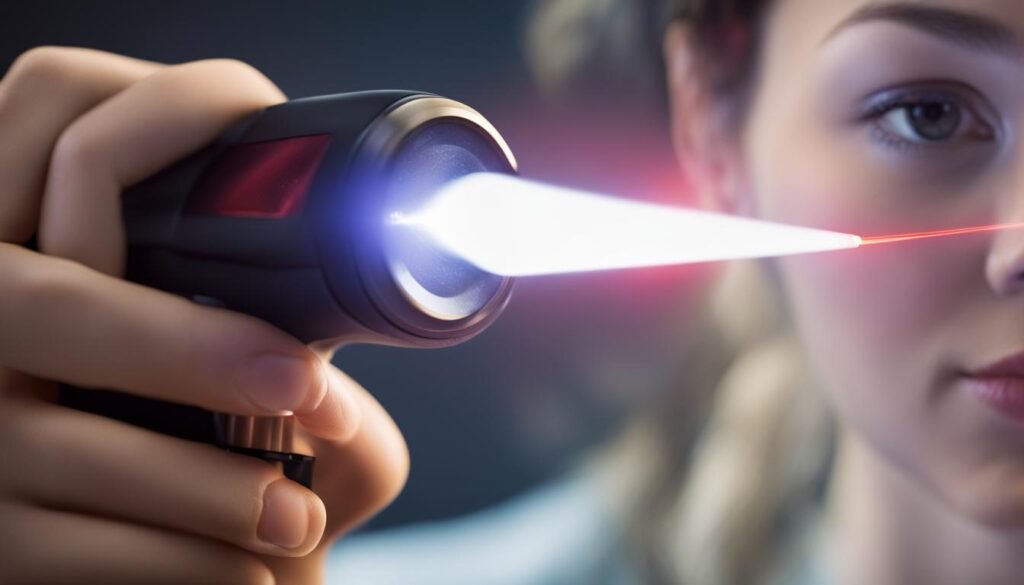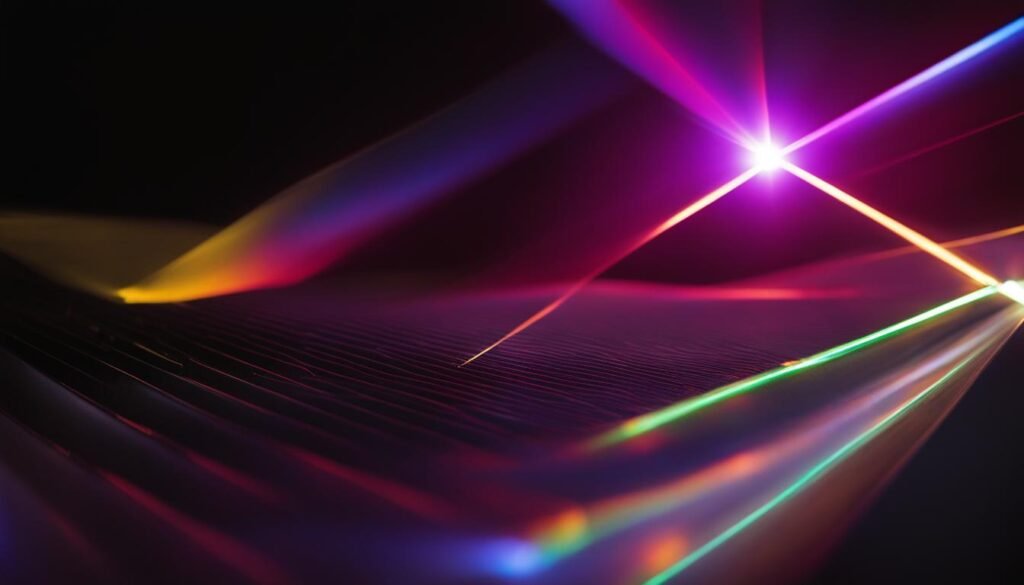Contents
- 1 The Advantages of Diode Lasers in Medical and Dental Procedures
- 2 The Role of Laser Diodes in Flow Cytometry
- 3 The Fundamentals of Diode Laser Hair Removal
- 4 Pros and Cons of Diode Laser Hair Removal
- 5 Conclusion
- 6 FAQ
- 6.1 What are laser diodes?
- 6.2 What are the applications of laser diodes?
- 6.3 How have advancements in laser diode technology improved performance?
- 6.4 Why are diode lasers popular in medical and dental procedures?
- 6.5 What is the role of diode lasers in flow cytometry?
- 6.6 How do diode lasers revolutionize hair removal procedures?
- 6.7 What are the advantages of diode laser hair removal?
- 6.8 Are there any downsides to diode laser hair removal?
- 7 Source Links
Laser diodes are a type of laser that generate laser radiation through a semiconductor. They vary in wavelength, power, and fiber type. Laser diodes have various applications, including in medicine, dentistry, and hair removal. Over the years, there have been advancements in laser diode technology, leading to improved performance and efficiency. Many companies specialize in manufacturing laser diodes, offering a wide range of products for different industries.
Key Takeaways:
- Laser diodes generate laser radiation through a semiconductor.
- Laser diode technology has advanced, improving performance.
- Laser diodes have applications in medicine, dentistry, and hair removal.
- Various companies specialize in manufacturing laser diodes.
- Laser diodes offer a wide range of products for different industries.
The Advantages of Diode Lasers in Medical and Dental Procedures
Diode lasers have emerged as a versatile and effective choice for medical and dental procedures, offering numerous advantages over traditional methods. These high-power diodes, based on semiconductor laser technology, deliver precise wavelengths ranging from 810 to 1064 nm, making them ideal for soft tissue procedures. The applications of diode lasers in the field of medicine are vast, including dermatology, ophthalmology, urology, and gynecology.
One of the key advantages of diode lasers is their ability to provide precise cutting and coagulation properties, allowing for efficient and controlled tissue removal. This makes them suitable for various applications, such as excising melanotic or highly vascularized soft tissues. Additionally, diode lasers offer excellent hemostasis, minimizing bleeding and improving patient outcomes.
In the field of dentistry, diode lasers have revolutionized restorative procedures. By delivering energy directly to the target tissues, diode lasers enable faster and more comfortable treatments. They can be used for tasks such as gingivectomy, frenectomy, and crown lengthening. Diode lasers are also effective in treating periodontal disease and promoting faster healing after oral surgeries.
Overall, the advantages of diode lasers in medical and dental procedures are vast. Their precision, versatility, and effectiveness make them a valuable tool for healthcare professionals, enhancing patient outcomes and improving treatment experiences.
The Role of Laser Diodes in Flow Cytometry
Laser diodes play a crucial role in flow cytometry, a technique used to analyze and sort cells based on their properties. These small, efficient devices emit intense beams of light, making them ideal for exciting fluorescent probes in flow cytometers. The market for laser diodes in flow cytometry applications has been growing steadily, thanks to their numerous advantages.
One primary advantage of using laser diodes in flow cytometry is their ability to provide multiple laser lines. Red, blue, and violet laser diodes are commonly used for different applications, allowing researchers to tailor their experiments to specific needs. For example, red diodes were initially the preferred choice but were limited in their ability to excite certain fluorescent probes. The development of blue and violet laser diodes has expanded the capabilities of flow cytometry, enabling the excitation of a wider range of fluorescent probes.
Laser diodes also offer long-term stability and low noise levels, which are essential for accurate and reliable flow cytometry analyses. Moreover, their relatively simple design makes them easy to integrate into flow cytometer systems. These factors, combined with their compact size and cost-effectiveness, have contributed to the widespread use of laser diodes in flow cytometry applications.
Overall, laser diodes have become an indispensable tool in flow cytometry, enabling researchers to gain valuable insights into cellular characteristics. With ongoing advancements in laser diode technology and the growing demand for flow cytometry analysis, the market for laser diodes in this field is expected to continue expanding in the coming years.
Table: Advantages of Laser Diodes in Flow Cytometry
| Advantages | Description |
|---|---|
| Versatile Excitation | Laser diodes provide multiple laser lines, including red, blue, and violet, allowing researchers to excite a wide range of fluorescent probes. |
| Long-Term Stability | Laser diodes offer stable emission over extended periods, ensuring consistent and reliable results in flow cytometry analysis. |
| Low Noise Levels | The low noise output of laser diodes reduces background noise during flow cytometry, resulting in improved signal-to-noise ratios. |
| Compact and Cost-Effective | Laser diodes are compact in size, making them easy to integrate into flow cytometer systems. They are also cost-effective compared to other laser technologies. |
The Fundamentals of Diode Laser Hair Removal

Diode lasers have revolutionized hair removal procedures by providing a more convenient and effective alternative to traditional methods. During diode laser hair removal, pulses of laser energy are used to target the hair follicles, inhibiting their growth. Diode lasers excel at removing both thick and dark hair, as well as lighter and finer strands. This procedure is suitable for individuals looking to minimize unwanted hair on various body areas, offering a long-lasting solution. The optical technique of diode lasers focuses heat on follicles without causing harm to surrounding tissues, ensuring permanent reduction of hair growth. Cooling devices are often used to enhance comfort during the sessions.
Diode laser hair removal has several advantages, including smoother skin, enduring results, and minimal risk of skin discoloration. However, there are also potential downsides, such as discomfort during the sessions and post-treatment effects like irritation, redness, or swelling. It is important to consider these factors before opting for diode laser hair removal. Understanding the benefits and limitations of this procedure allows individuals to make an informed decision about their hair removal journey.
The Advantages of Diode Laser Hair Removal:
- Convenient and effective alternative to traditional hair removal methods
- Removes both thick and dark hair as well as lighter and finer strands
- Offers long-lasting results and smoother skin
- Minimal risk of skin discoloration
Considerations for Diode Laser Hair Removal:
- Possible discomfort during the sessions
- Potential post-treatment effects like irritation, redness, or swelling
As technology advances, diode laser hair removal continues to evolve, offering individuals a reliable and innovative solution for long-lasting hair reduction. It is essential to consult with a qualified professional to determine if diode laser hair removal is the right choice for your hair removal needs.
Pros and Cons of Diode Laser Hair Removal

Diode laser hair removal has gained popularity as a convenient and effective method for long-lasting hair reduction. However, like any cosmetic procedure, it has its advantages and disadvantages that individuals should consider before undergoing treatment.
Pros of Diode Laser Hair Removal:
- Smoothing Effects on the Skin: Diode lasers can significantly reduce hair growth, resulting in smoother skin. The procedure targets hair follicles, inhibiting their growth and providing long-lasting results.
- Enduring Results: Unlike temporary hair removal methods like shaving or waxing, diode laser hair removal offers more enduring results. It can provide long-term reduction of hair growth, minimizing the need for frequent maintenance.
- Minimal Risk of Skin Discoloration: Laser technology used in diode laser hair removal is designed to selectively target hair follicles without causing harm to the surrounding skin. This significantly reduces the risk of skin discoloration compared to other hair removal methods.
Cons of Diode Laser Hair Removal:
- Discomfort During Sessions: While diode laser hair removal is generally well-tolerated, some individuals may experience discomfort during the treatment sessions. The sensation can vary depending on the individual’s pain tolerance and the sensitivity of the treated area.
- Post-Treatment Effects: Following diode laser hair removal, some individuals may experience temporary side effects such as skin irritation, redness, or swelling in the treated area. These effects typically subside within a few hours or days.
Before deciding on diode laser hair removal, it is essential to consult with a qualified professional who can assess your suitability for the procedure and address any concerns you may have. By understanding the pros and cons, you can make an informed decision about whether diode laser hair removal is the right choice for you.
Conclusion
Laser diodes have seen remarkable advancements in technology, revolutionizing various industries and applications. With their ability to generate laser radiation through semiconductors, laser diodes have become an integral part of medical, dental, and cosmetic procedures.
These advancements have led to improved performance and efficiency, making laser diodes a preferred choice for professionals in these fields. The laser diode market continues to grow, with manufacturers offering a wide range of products to cater to the diverse needs of different industries.
From surgical procedures to flow cytometry and hair removal, laser diodes have proven to be versatile and effective. Their long-term stability, low noise levels, and relatively simple design make them ideal for a range of applications, including exciting fluorescent probes in flow cytometry or providing a precise cutting and coagulation properties in medical and dental procedures.
As technology continues to advance, laser diodes are expected to play an even bigger role in shaping the future of various fields. Whether it’s through further advancements in laser diode technology or the development of new applications, the impact of laser diodes is set to expand.
FAQ
What are laser diodes?
Laser diodes are a type of laser that generate laser radiation through a semiconductor.
What are the applications of laser diodes?
Laser diodes have various applications, including in medicine, dentistry, and hair removal.
How have advancements in laser diode technology improved performance?
Over the years, there have been advancements in laser diode technology, leading to improved performance and efficiency.
Why are diode lasers popular in medical and dental procedures?
Diode lasers are versatile and effective, making them a popular choice in medical and dental procedures.
What is the role of diode lasers in flow cytometry?
Diode lasers play a crucial role in flow cytometry, a technique used to analyze and sort cells based on their properties.
How do diode lasers revolutionize hair removal procedures?
Diode lasers provide a more convenient and effective alternative to traditional hair removal methods.
What are the advantages of diode laser hair removal?
Diode laser hair removal offers smoother skin, enduring results, and minimal risk of skin discoloration.
Are there any downsides to diode laser hair removal?
Discomfort and post-treatment effects like irritation, redness, or swelling are potential downsides of diode laser hair removal.



